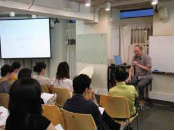e-newsletter Issue No. 29
Being a teenager and raising a teenager are individually, and collectively, enormous challenges. For many teens, illicit substance use and abuse become part of the landscape of their teenage years. Although most adolescents who use drugs do not progress to become drug abusers, or drug addicts in adulthood, drug use in adolescence is a very risky proposition. Even small degrees of substance abuse (for example, alcohol, marijuana, and inhalants) can have negative consequences. Typically, school and relationships, notably family relationships, are among the life areas that are most influenced by drug use and abuse.










